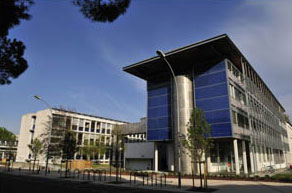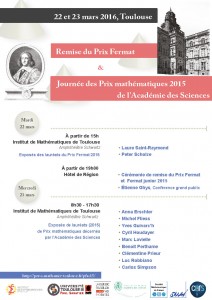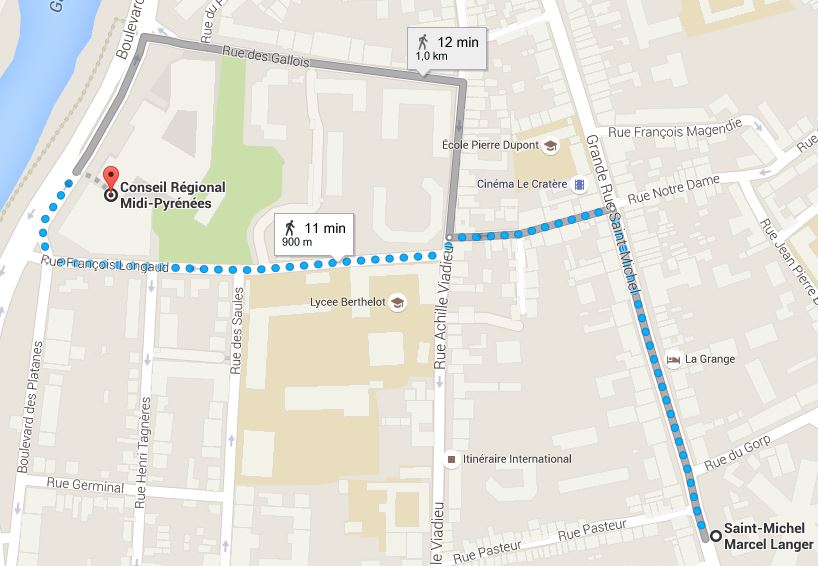The Institut de Mathématiques de Toulouse (Toulouse Mathematics Institute) is organizing, on 22 and 23 March 2016, two scientific meetings in honour of the laureates 2015 of the Fermat Prizes and of the mathematical Prizes from the Académie des Sciences (French Academy of Sciences). These events will be the occasion to present current researches in mathematics to diverse audiences:
– The Mathematics popularization talk (in French) by Etienne Ghys on 22 March will be directed to any person interested in Mathematics (with a college scientific background).
– The talks (in French) on 23 March will be given by the laureates 2015 of the Académie des Sciences. They aim at giving a picture of the award-winning mathematical works and will be understandable by mathematics graduate students.
– The talks on 22 March by the Fermat Prize 2015 laureates will be of colloquium type for mathematicians, not necessarily specialists of the presented subjects.
> On Thursday 22 March, the talks by the Fermat Prize senior laureates will take place at the Institut de Mathématiques de Toulouse, while the popularization talk and the awarding ceremony will be at the Hôtel de Région Languedoc Roussillon Midi Pyrénées.
> On Wednesday 23 March the talks by the laureates of the mathematical prizes awarded by the Academie des Sciences will take place at the Institut de Mathématiques de Toulouse.
Downloadable poster:
To come at the Institut de Mathématiques de Toulouse

Institut de Mathématiques de Toulouse, Université Toulouse III – Paul Sabatier, 118, route de Narbonne – bât. 1R3
Awarding ceremony of the Fermat Prizes 2015
The Fermat Prize of research in Mathematics and the Fermat Prize Junior are awarded every other year. They are respectively granted by the Région Languedoc Roussillon Midi Pyrénées (20000€) and the Université Paul Sabatier (2000€), and by tradition the awarding ceremony takes place at the Hôtel de Région.
Presentation of the Fermat Prize
Schedule of Thursday 22 March 2016
⇒ At the Institut de Mathématiques de Toulouse, amphitheater Schwartz
Talks by the laureates 2015 of the Fermat Prize of research in Mathematics.
| 15h00 | Laure Saint-Raymond | |
| 16h00 | Peter Scholze | |
| 17h00 | Coffee break |
⇒ At the Hôtel de Région, grand amphitheater
| 19h00 |
Introductory speeches by the representative of the Région Languedoc Roussillon Midi Pyrénées and by Jean-Pierre Vinel, President of the Université Toulouse III – Paul SabatierPresentation of the Senior and Junior Fermat Prizes |
| 19h30 |
Awarding ceremony of the Junior Fermat Prizes 2015 (Gary Bécigneul, Medhi Trense) and of the Senior Fermat Prizes 2015 (Laure Saint-Raymond, Peter Scholze) |
| 19h45 | Mathematics popularization talk by Étienne Ghys (Académie des Sciences) |
| 21h00 | Cocktail organized in the Hall Savary |
The Région Languedoc Roussillon Midi Pyrénées is putting in place an Internet site for the inscription to this evening. As soon as it will be constructed, you will find here a direct link.
Day of the Prizes 2015 in Mathematics of the Académie des Sciences
Wednesday 23 March 2016 will be devoted to talks (in French) by the laureates 2015 of Prizes in Mathematics awarded by the Académie des Sciences. This event is a tradition initiated by the SMF, associated as of this year with the SMAI.
The list of the previous editions is available at under this link.
Schedule of Wednesday 23 March 2016
⇒ At the Institut de Mathématiques de Toulouse, amphitheater Schwartz
| 8h30 | Welcome reception |
| 9h00 | Benoît Perthame |
| 9h40 | Yves Guivarc’h : Asymptotiques de Pareto et propriétés d’isolation spectrale pour les marches aléatoires affines |
| 10h20 | Luc Robbiano : Problème mal posé et équation des ondes |
| 11h00 | Coffee break |
| 11h30 | Clémentine Prieur |
| 12h10 | Michel Fliess |
| 12h50 | Lunch break |
| 14h00 | Anna Erschler (to be confirmed) |
| 14h40 | Carlos Simpson |
| 15h20 | Coffee break |
| 15h50 | Cyril Houdayer : Groupes, Actions et algèbres de von Neumann |
| 16h30 | Marc Lavielle |
| 17h10 | End |
Abstracts
Anna Erschler (École Normale Supérieure de Paris) – Prix Élie Cartan
Michel Fliess (École Polytechnique) – Prix Ampère de l’Électricité de France
Yves Guivarc’h (Université de Rennes 1) – Prix fondé par l’État
Title : Asymptotiques de Pareto et propriétés d’isolation spectrale pour les marches aléatoires affines
Cyril Houdayer (Université Paris-Sud) – Prix Jacques Herbrand
Title : Groupes, Actions et algèbres de von Neumann
Abstract : A toute action non-singulière d’un groupe dénombrable discret sur un espace mesuré standard, on peut associer une algèbre de von Neumann. Une question centrale en Algèbres d’Opérateurs est de savoir quelle information cette algèbre de von Neumann retient du groupe et de l’action. Le théorème célèbre d’Alain Connes (1976) montre que les algèbres de von Neumann provenant des groupes moyennables sont complètement classifiées. Dans le cas des groupes non-moyennables, la théorie de déformation/rigidité de Sorin Popa a récemment permis d’obtenir des phénomènes de rigidité. Sous certaines hypothèses, il est possible de retrouver le groupe et l’action à partir de l’algèbre de von Neumann. Je présenterai une introduction à ce domaine de recherche.
Marc Lavielle (Université Paris-Sud) – Prix de l’innovation INRIA, Académie des Sciences, Dassault Systèmes
Benoît Perthame (Université Paris 6) – Grand Prix INRIA, Académie des Sciences
Clémentine Prieur (Université Grenoble 1) – Prix Blaise Pascal du GAMNI-SMAI
Luc Robbiano (Université de Versailles Saint-Quentin) – Prix Langevin
Title : Problème mal posé et équation des ondes
Abstract : Dans cet exposé nous donnerons des résultats sur le problème suivant.
Considérons une solution de l’équation des ondes, nulle sur un sous-domaine d’espace-temps, cette solution est-elle nulle sur un domaine plus grand ? Ce problème revient à rechercher l’unicité de la solution par rapport à des hypersurfaces dont la normale est de type espace. Par rapport à ce type d’hypersurface, le problème est mal-posé, c’est-à-dire qu’on ne peut pas résoudre le problème pour toutes données sur ces surfaces, contrairement aux hypersurfaces dont la normale est de type temps pour lesquelles le problème est hyperbolique et donc bien-posé.
Nous donnerons les résultats anciens en dimension un d’espace et pour les équations à coefficients analytiques. Puis, sous des hypothèses sur les coefficients, nous donnerons des résultats plus récents ainsi que des contre-exemples.
Carlos Simpson (Université de Nice Sophia Antipolis) – Prix Sophie Germain, Fondation de l’Institut de France
Organization: Marie-Laure Ausset and Laurent Miclo


